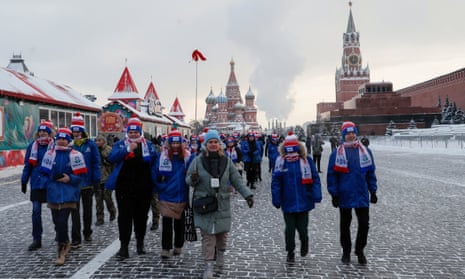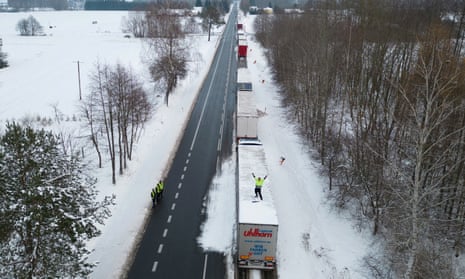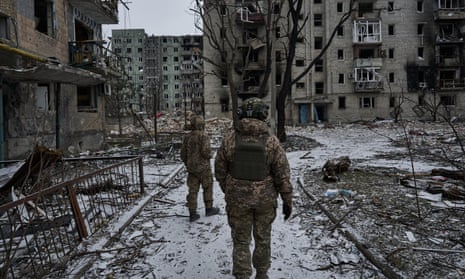Ukraine’s first lady warns that Ukrainians in ‘mortal danger’ without foreign aid
Ukraine’s first lady, Olena Zelenska, has warned that Ukrainians are in “mortal danger” of being left to die if western countries do not continue their financial support, in an interview with the BBC.
Zelenska made the remarks a day after Republican senators in the US blocked a key aid bill that would have provided more than $60bn worth of support to Ukraine.
Zelenska told the BBC the slowdown in aid represented a “mortal danger” for her country:
We really need the help. In simple words, we cannot get tired of this situation, because if we do, we die. And if the world gets tired, they will simply let us die.
It hurts us greatly to see the signs that the passionate willingness to help may fade. It is a matter of life for us. Therefore, it hurts to see that.
The White House has warned that US funds for Ukraine could soon run out, and Republicans have held up a deal to authorise more assistance.
The UK has also been urging politicians in Washington DC to agree on a deal for Ukraine. The UK foreign secretary, David Cameron, said on a visit to Washington this week that the US was the “linchpin” of the western coalition backing Ukraine’s fight against Russia.
Key events
Nearly two years after Moscow’s invasion of Ukraine, the Russian economy has demonstrated surprising resilience in the face of an unprecedented avalanche of western sanctions, AFP reports.
But economists continue to warn that Russia’s wartime economy may be showing signs of overheating, while western leaders are hoping the sanctions will finally bite. A French diplomatic source expressed hope that the economic penalties would start to be felt in late 2024 or early 2025.

Sanctions “are like a small puncture in a tire. It’s not immediate, but it works,” another European diplomatic source said. “It’s a marathon, not a sprint,” said Agathe Demarais, an analyst at the European Council on Foreign Relations.
She said the goal of the penalties was not to trigger the collapse of the world’s ninth-largest economy, which could have provoked a global crisis, nor to bring about regime change. “Their aim is to limit the capabilities of the Russian war machine,” said Demarais.
The EU has imposed 11 rounds of sanctions on Russia since its all-out invasion of Ukraine in February 2022, including hitting its key oil and gas exports. The 12th package of measures, including a ban on the import of Russian diamonds, is now in the works.
According to official figures, 49 percent of European exports to Russia and 58 percent of Russian imports are under sanctions. Even if Russia has become the most sanctioned country in the world, its economy has been dented but not devastated.
Pickup trucks and tourniquets bound for Ukraine’s battlefield are stuck in the miles long line at the border with Poland, leaving components to build drones to facing weeks of delays.
Ukrainian charities and companies supplying the war-torn country’s military have told of growing concerns as Polish truck drivers show no sign of ending a border blockade that has stretched past a month since 6 November – creating lines that stretch for more than 19 miles and last up to three weeks in freezing temperatures.
The Polish protesters argue that Ukrainian truckers are effectively putting their livelihoods at stake by undercutting them after the EU relaxed limits on the number of Ukrainian drivers able to operate in Poland.
While drones will make it to the front line, they are being delayed by two to three weeks, according Oleksandr Zadorozhnyi, operational director of the KOLO foundation, which helps the Ukrainian army with battlefield tech, including drones and communications equipment.
About 200 pickup trucks needed to transport ammunition and evacuate the wounded from the front line are blocked at the border because “deliveries have practically stopped,” said Ivan Poberzhniak, head of procurement and logistics for Come Back Alive, Ukraine’s largest charitable organization providing the military with equipment. The pickup trucks are easy targets for Russia, so it’s impossible to deliver enough of them even normally, he said.
The protesters insist that they’re not stopping military transports or humanitarian aid into Ukraine. “Aid for the military passes through without having to wait at all,” said Waldemar Jaszczur, a protest organiser. He added that Ukrainian truckers have been doing unauthorised transport services across Europe. They are asking “glaringly low prices” — 35% lower than what Polish truckers charge — and are “driving us out of the market,” he said.

A deal to provide further US assistance to Ukraine by the end of the year appears to be increasingly out of reach for president Joe Biden.
The impasse is deepening in Congress despite warnings from the White House about the consequences of inaction. Republicans insist on pairing the funding with America’s immigration and border policies, with historic numbers of migrants arriving at the southern border.
After the Democratic president said this week that he was willing to “make significant compromises on the border”, Republicans swiftly revived demands that they had earlier set aside, hardening their positions and attempting to shift the negotiations to the right, according to a person familiar with the talks quoted by Associated Press.
Biden is facing the prospect of a cornerstone of his foreign policy — repelling Russia’s Vladimir Putin from taking over Ukraine — crumbling as US support for funding the war wanes, especially among Republicans. The White House says a failure to approve more aid by year’s end could have catastrophic consequences for Ukraine and its ability to fight.
To preserve US support, the Biden administration has quietly engaged in Senate talks on border policy in recent weeks, providing assistance to the small group of senators trying to reach a deal and communicating what policy changes it would find acceptable.
Ukraine’s first lady warns that Ukrainians in ‘mortal danger’ without foreign aid
Ukraine’s first lady, Olena Zelenska, has warned that Ukrainians are in “mortal danger” of being left to die if western countries do not continue their financial support, in an interview with the BBC.
Zelenska made the remarks a day after Republican senators in the US blocked a key aid bill that would have provided more than $60bn worth of support to Ukraine.

Zelenska told the BBC the slowdown in aid represented a “mortal danger” for her country:
We really need the help. In simple words, we cannot get tired of this situation, because if we do, we die. And if the world gets tired, they will simply let us die.
It hurts us greatly to see the signs that the passionate willingness to help may fade. It is a matter of life for us. Therefore, it hurts to see that.
The White House has warned that US funds for Ukraine could soon run out, and Republicans have held up a deal to authorise more assistance.
The UK has also been urging politicians in Washington DC to agree on a deal for Ukraine. The UK foreign secretary, David Cameron, said on a visit to Washington this week that the US was the “linchpin” of the western coalition backing Ukraine’s fight against Russia.
Russian troops press on town of Avdiivka
Ukraine says its forces have repelled 32 enemy attacks in the town of Avdiivka, which is dominated by a vast coking plant, Reuters reports.
The head of the military administration in the town, less than 12km from the outskirts of the Moscow-held regional capital of Donetsk, said Russian forces were “pressing on the entire defensive line around the town”.

“Weather conditions prevent the occupiers from using their vehicles, so they resort to ‘human wave’ assaults, throwing more personnel into battles,” Vitaliy Barabash said.
Moscow’s forces have been inching forward on the flanks to try to cut supply lines.
A Ukrainian military spokesperson, Oleksandr Shtupun, said Russian forces had suffered heavy losses around the town.He told national television Russian forces had dropped about 450 bombs in the region and were bringing in reserves.
The Russian defence ministry rarely mentions Avdiivka in its reports, but the war blog Rybar said on Friday that battles were raging by the coking plant and near Stepove village, north of the city. Rybar acknowledged that the front was all but unchanged.
Opening summary
It is 10am in Kyiv and we are restarting our rolling coverage of the war in Ukraine.
Ukraine says its forces have repelled 32 enemy attacks in the town of Avdiivka as Russian troops have been inching forward to try to cut supply lines. The head of the military administration in the town, less than 12km from the outskirts of the Moscow-held regional capital of Donetsk, said Russian forces were “pressing on the entire defensive line around the town”.
In other recent developments:
-
The Kremlin has said that the idea Russia would engage in peace talks with Ukraine on Kyiv’s terms in 2024 was unrealistic. It was responding to a media report that said Washington wanted such a scenario to unfold. The Kremlin spokesperson, Dmitry Peskov, called the idea “absolutely unrealistic”.
-
Russia has launched a wave of cruise missiles against Ukraine, killing at least one person and injuring six, as the Ukrainian president, Volodymyr Zelenskiy, warned of attacks by Moscow this winter on energy infrastructure. Ukrainian air defences shot down 14 of 19 missiles fired by Russia during a morning airstrike, Ukrainian officials said, including those heading for Kyiv.
-
Vladimir Putin has said he will run for re-election in the March 2024 presidential poll, moving the longtime Russian leader a step closer to a fifth term in office. The announcement was widely expected, with Putin’s long-term spokesperson saying in a previous interview: “Putin will be re-elected next year with more than 90% of the vote.”
-
The Ukrainian parliament has approved four bills necessary to start European Union accession talks, including one on national minorities’ rights, a critical demand from Hungary, which opposes Ukraine’s EU bid. The Ukrainian parliament’s website confirmed that President Volodymyr Zelenskiy signed all the bills into law.
-
“We expect that Ukraine’s efforts will be duly appreciated by leaders of the European Union and the corresponding European promises to Ukraine will be fulfilled,” Zelenskiy said. Ukraine, he said, had “done everything expected of us” in taking on EU recommendations.
-
European Union leaders are conscious of how “existential” financial aid is to Ukraine and will honour their commitments, a senior official said, less than a week before a summit where billions in aid for Kyiv hang in the balance. Ahead of the year’s final summit of EU leaders in Brussels, on 14 and 15 December, Hungary has threatened to veto a proposal for the bloc to grant €50bn in budget aid to Kyiv through 2027.
-
The EU’s executive is due to approve next week a legal proposal on using proceeds from Russian assets frozen under sanctions, but doubts in France, Germany and Belgium mean Ukraine would not get the money anytime soon, officials and diplomatic sources said. The draft law is expected on 12 December.
-
Zelenskiy has underscored Kyiv’s need for more air defences and the importance of EU unity in the run-up to a key summit next week. The Ukrainian leader said that during a call with Estonia’s prime minister, Kaja Kallas, the leaders “discussed the importance of maintaining EU political and financial support for Ukraine, as well as EU unity in light of the expected [European Council] summit decisions to open accession negotiations and provide €50bn in support.”
-
Ukraine’s farm ministry has raised its 2023 grain harvest forecast to 59.7m tonnes, saying the country had a “record grain yield”. The total grain and oilseed harvest is expected to reach 81.3m tonnes, the ministry added in a statement.

